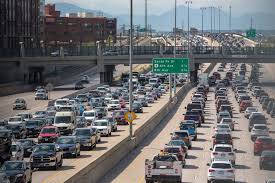
Voters in Denver will decide in November whether they want to increase their city sales tax all in the name of reducing the city’s climate footprint.
If approved, the city beginning in January would impose a 0.25% sales tax, whose funding would be dedicated to renewable energy efforts, including “steep reductions” in fossil fuel consumption and “significant improvements” in air and water quality, the bill states. Half of the revenue will be dedicated directly to underserved communities with a “strong lens toward equity, race and social justice.”
Colorado Politics reported the Denver City Council referred the measure to the ballot on Monday night in an 11-1 vote. Councilman Kevin Flynn, who represents District 2 in southwest Denver, voted against the measure on grounds that the city “settled on the default, the easy way out, which is sales tax, which is regressive.” Asking voters to give the city money in the wake of a pandemic and economic downturn, he said, is not the “appropriate way” to raise this revenue.
“I feel that we’re asking too much from our voters right now,” Flynn reasoned, highlighting the fact that the city will also ask voters to raise sales taxes to fund homelessness services, which Flynn plans to support.
He said he would rather see Resilient Denver’s ballot initiative move forward, which would have established a tax on electricity and natural gas. Resilient Denver advocates say they will now pull their ballot initiative with the referral of this new tax.
Councilwoman Candi CdeBaca, who represents the Elyria-Swansea neighborhood in District 9, agreed with Flynn and Morris, but maintained voters should have a choice.
“I think our voters are smart, and I think our voters are frustrated about how we’ve used tax dollars,” she said. “And when they see tax increases on the ballot, I don’t think we’ve given them a reason to pass any of them … or proof of our ability to manage their money wisely in the first place.”
The increase is estimated to generate about $36 million in its first year, accounting for the economic fallout from the coronavirus pandemic, according to the city’s 26-member Climate Action Task Force, which led the initiative. The committee is made up of representatives from the Sierra Club, Denver Metro Association of Realtors, Xcel Energy, the International Indigenous Youth Council, Denver Streets Partnership and others.
Funds would be used for clean energy jobs, investments in solar power, neighborhood-based environmental and climate justice programs, adaptation and resiliency programs that help vulnerable communities prepare for climate change, clean transportation programs, and more.
Source: Colorado Politics





